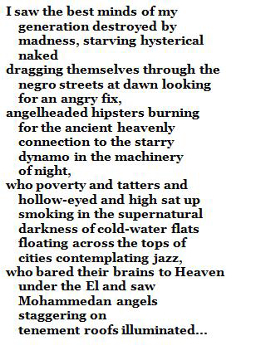 Downtown Beirut is marked by the intersection of six broad, clean, well-lit boulevards, lined by cafes, upmarket boutiques and bars and eerily deserted, its lifeless sidewalks and tables controlled from barb-wired checkpoints by armored personnel carriers and men with machine guns. The once-upon-a-time diva of the Middle East is still an amazing city, two civil wars, one Syrian and two Israeli occupations down the line.
Downtown Beirut is marked by the intersection of six broad, clean, well-lit boulevards, lined by cafes, upmarket boutiques and bars and eerily deserted, its lifeless sidewalks and tables controlled from barb-wired checkpoints by armored personnel carriers and men with machine guns. The once-upon-a-time diva of the Middle East is still an amazing city, two civil wars, one Syrian and two Israeli occupations down the line. There is still much that is "American" about Beirut. Although the city once hailed as the Paris of the Middle East now seems more like its second Jerusalem. The mix of "western" shops, American diners, and Falafel joints is strongly reminiscent of Israel with its crowds of young students and security checkpoints, barriers, random violence and highly visible, machine-gun toting police and army officers. All too often, the view from the diner, bar or seaside cafe offers a cityscape of bullet-scarred facades: Constant reminders of a violent past--and indeed a violent present--of pervasive sectarian infighting.
 The divisions running through Beirut and Lebanon have taken different forms over the years, the Sunni-Maronite conflict of Lebanon's founding years eclipsed by the influx of largely Shi'ite Palestinian refugees after Jordan's "black September" and the concomitant erosion of the sectarian checks and balances written into the country's political system. These days, political violence has regrouped around two symbolic dates. The March 8th coalition commemorates the Syrian national holiday (when Hafez, once upon a time, dispatched his Baathist competitors) and the Hizbullah rally held on its anniversary in 2005 asking the Syrians to stay in Lebanon. The March 14 coalittion takes as its namesake the counter-rally that sparked the Cedar Revolution.
The divisions running through Beirut and Lebanon have taken different forms over the years, the Sunni-Maronite conflict of Lebanon's founding years eclipsed by the influx of largely Shi'ite Palestinian refugees after Jordan's "black September" and the concomitant erosion of the sectarian checks and balances written into the country's political system. These days, political violence has regrouped around two symbolic dates. The March 8th coalition commemorates the Syrian national holiday (when Hafez, once upon a time, dispatched his Baathist competitors) and the Hizbullah rally held on its anniversary in 2005 asking the Syrians to stay in Lebanon. The March 14 coalittion takes as its namesake the counter-rally that sparked the Cedar Revolution.
 The divisions running through Beirut and Lebanon have taken different forms over the years, the Sunni-Maronite conflict of Lebanon's founding years eclipsed by the influx of largely Shi'ite Palestinian refugees after Jordan's "black September" and the concomitant erosion of the sectarian checks and balances written into the country's political system. These days, political violence has regrouped around two symbolic dates. The March 8th coalition commemorates the Syrian national holiday (when Hafez, once upon a time, dispatched his Baathist competitors) and the Hizbullah rally held on its anniversary in 2005 asking the Syrians to stay in Lebanon. The March 14 coalittion takes as its namesake the counter-rally that sparked the Cedar Revolution.
The divisions running through Beirut and Lebanon have taken different forms over the years, the Sunni-Maronite conflict of Lebanon's founding years eclipsed by the influx of largely Shi'ite Palestinian refugees after Jordan's "black September" and the concomitant erosion of the sectarian checks and balances written into the country's political system. These days, political violence has regrouped around two symbolic dates. The March 8th coalition commemorates the Syrian national holiday (when Hafez, once upon a time, dispatched his Baathist competitors) and the Hizbullah rally held on its anniversary in 2005 asking the Syrians to stay in Lebanon. The March 14 coalittion takes as its namesake the counter-rally that sparked the Cedar Revolution.The eights and the fourteens, as they are affectionately known in Lebanon, agree about very little. This, apparently, is the problem. Even the fourteens, amongst themselves, have their share of political differences. At least, however, they can agree that they are Lebanese--something March 8 with their pro-Syrian orientation and the strong Palestinian identity of many of its backers--cannot.



.jpg)

No comments:
Post a Comment